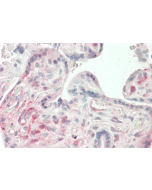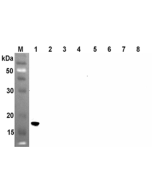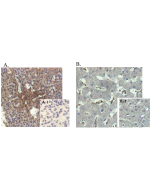Cookie Policy: This site uses cookies to improve your experience. You can find out more about our use of cookies in our Privacy Policy. By continuing to browse this site you agree to our use of cookies.
AdipoGen Life Sciences
anti-ANGPTL4 (fibrinogen-like domain) (human), pAb

A)
1: Human ANGPTL4 (FLD) (FLAG®-tagged).
2: Human ANGPTL4 (FLAG®-tagged).
3: Human ANGPTL4 (CCD) (FLAG®-tagged).
4: Human ST2 (FLAG®-tagged) (negative control).
B)
1: Human ANGPTL3 (FLD) (FLAG®-tagged).
2: Human ANGPTL3 (FLAG®-tagged).
3: Human ANGPTL6 (FLAG®-tagged).
4: Human ANGPTL6 (FLD) (FLAG®-tagged).
5: Human ANGPTL5 (FLD) (FLAG®-tagged).
| Product Details | |
|---|---|
| Synonyms | Angiopoietin-like Protein 4; FIAF; Fasting-induced Adipose Factor; HFARP; Hepatic Fibrinogen/Angiopoietin-related Protein |
| Product Type | Polyclonal Antibody |
| Properties | |
| Source/Host | Rabbit |
| Immunogen/Antigen | Fibrinogen-like domain of recombinant human ANGPTL4. |
| Application |
ELISA: (direct and indirect: 1:2’000-1:5’000) |
| Crossreactivity | Human |
| Specificity |
Recognizes the fibrinogen-like domain of human ANGPTL4. Detects a band of ~38kDa by Western blot. Weakly cross-reacts with human ANGPTL3 (fibrinogen-like domain), ANGPTL5 (fibrinogen-like domain), ANGPTL6 (fibrinogen-like domain) and ANGPTL6. Does not cross-react with ANGPTL4 (coiled-coil domain) or other ANGPTL family proteins. |
| Purity Detail | Protein A-affinity purified. |
| Concentration | 1mg/ml |
| Formulation | Liquid. 0.2μm-filtered solution in PBS, pH 7.4. Contains no preservatives. |
| Isotype Negative Control | |
| Shipping and Handling | |
| Shipping | BLUE ICE |
| Short Term Storage | +4°C |
| Long Term Storage | -20°C |
| Handling Advice |
After opening, prepare aliquots and store at -20°C. Avoid freeze/thaw cycles. |
| Use/Stability | Stable for at least 6 months after receipt when stored at -20°C. |
| Documents | |
| MSDS |
 Download PDF Download PDF |
| Product Specification Sheet | |
| Datasheet |
 Download PDF Download PDF |
ANGPTL4 mainly expressed in endothelial cells (hypoxia-induced). Regulates angiogenesis and modulates tumorgenesis and directly regulates lipid, glucose, and energy metabolism. Inhibits proliferation, migration, and tubule formation of endothelial cells and reduces vascular leakage. ANGPTL4 is a protein consisting of an N-terminal coiled-coil domain and a C-terminal fibrinogen-like domain (FLD). Both domains have distinct biological functions. The coiled-coil domain is responsible for the inhibitory effects on lipoprotein lipase (LPL) converting the active form of LPL into an inactive form, and the FLD domain mediates its antiangiogenic functions. The coiled coil and the FLD domains are separated by a short linker that can be cleaved after secretion. ANGPTL4 appears on the cell surface as the full-length form, where it can be released by heparin treatment. ANGPTL4 protein is then proteolytically cleaved by proprotein convertases (PCs), including furin, PC5/6, paired basic amino acid-cleaving enzyme 4, and PC7.









